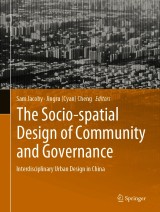Details

The Socio-spatial Design of Community and Governance
Interdisciplinary Urban Design in China|
CHF 177.00 |
|
| Verlag: | Springer |
| Format: | |
| Veröffentl.: | 18.01.2021 |
| ISBN/EAN: | 9789811568114 |
| Sprache: | englisch |
Dieses eBook enthält ein Wasserzeichen.
Beschreibungen
<p></p><p>This book proposes a new interdisciplinary understanding of urban design in China based on a study of the transformative effects of socio-spatial design and planning on communities and their governance. This is framed by an examination of the social projects, spaces, and realities that have shaped three contexts critical to the understanding of urban design problems in China: the histories of “collective forms” and “collective spaces”, such as that of the urban <i>danwei</i> (work-unit), which inform current community building and planning; socio-spatial changes in urban and rural development; and disparate practices of “spatialised governmentality”. These contexts and an attendant transformation from planning to design and from government to governance, define the current urban design challenges found in the dominant urban <i>xiaoqu</i> (small district) and <i>shequ</i> (community) development model. Examining the histories, transformations, and practices that have shaped socio-spatial epistemologies and experiences in China – including a specific sense of community and place that is rather based on a concrete “collective” than abstract “public” space and underpinned by socialised governance – this book brings together a diverse range of observations, thoughts, analyses, and projects by urban researchers and practitioners. Thereby discussing emerging interdisciplinary urban design practices in China, this book offers a valuable resource for all academics, practitioners, and stakeholders with an interest in socio-spatial design and development.</p><p><br></p><br><p></p>
<div><br></div>
<p></p><p><b>Sam Jacoby</b> is Professor of Architectural and Urban Design Research and Research Leader of the School of Architecture at the Royal College of Art. His diverse practice-led research focuses on transdisciplinary design research with public and social impact. He is co-founder and former Director of the MPhil in Architecture and Urban Design: Projective Cities at the Architectural Association School of Architecture (2009–2019), and has taught at universities in the UK and Germany. His recent publications include the book Drawing Architecture and the Urban (2016) and the guest co-edited special journal issue ‘Collective Forms in China: A Contemporary Review’ for New Architecture (2018).</p><p> </p><p> </p><p> </p><b>Jingru (Cyan) Cheng</b> is a researcher of the Laboratory for Design & Machine Learning and design tutor in the MA Architecture programme at the Royal College of Art. Cheng’s works on Chinese rurality and domesticity (2018) and China’s People’s Commune (2020) are respectively recognised by the RIBA (Royal Institute of British Architects) President’s Awards for Research. Cheng’s design research practice does not dwell on a defined subject matter, but rather meandering through architecture, anthropology and art. The wide-ranging themes include, non-canonical histories and socio-spatial models, diverse ways of cultural knowing and being, aesthetic agency, and modes of co-existence and affinity between human and non-human.<p></p><p></p><div><br></div>
<p></p><p>This book proposes a new interdisciplinary understanding of urban design in China based on a study of the transformative effects of socio-spatial design and planning on communities and their governance. This is framed by an examination of the social projects, spaces, and realities that have shaped three contexts critical to the understanding of urban design problems in China: the histories of “collective forms” and “collective spaces”, such as that of the urban <i>danwei</i> (work-unit), which inform current community building and planning; socio-spatial changes in urban and rural development; and disparate practices of “spatialised governmentality”. These contexts and an attendant transformation from planning to design and from government to governance, define the current urban design challenges found in the dominant urban <i>xiaoqu</i> (small district) and <i>shequ</i> (community) development model. Examining the histories, transformations, and practices that have shaped socio-spatial epistemologies and experiences in China – including a specific sense of community and place that is rather based on a concrete “collective” than abstract “public” space and underpinned by socialised governance – this book brings together a diverse range of observations, thoughts, analyses, and projects by urban researchers and practitioners. Thereby discussing emerging interdisciplinary urban design practices in China, this book offers a valuable resource for all academics, practitioners, and stakeholders with an interest in socio-spatial design and development. </p>
<p> </p><br><p></p>
<p> </p><br><p></p>
<p>Presents a case study-based analysis, enabling readers to gain a detailed understanding of the unique challenges of urban design in China</p><p>Provides comprehensive plan documentation and analysis of collective housing projects from the Mao Era for students, researchers, and practitioners</p><p>Offers an essential review of urban design policy and related social policy in China for practitioners and researchers alike</p>

















